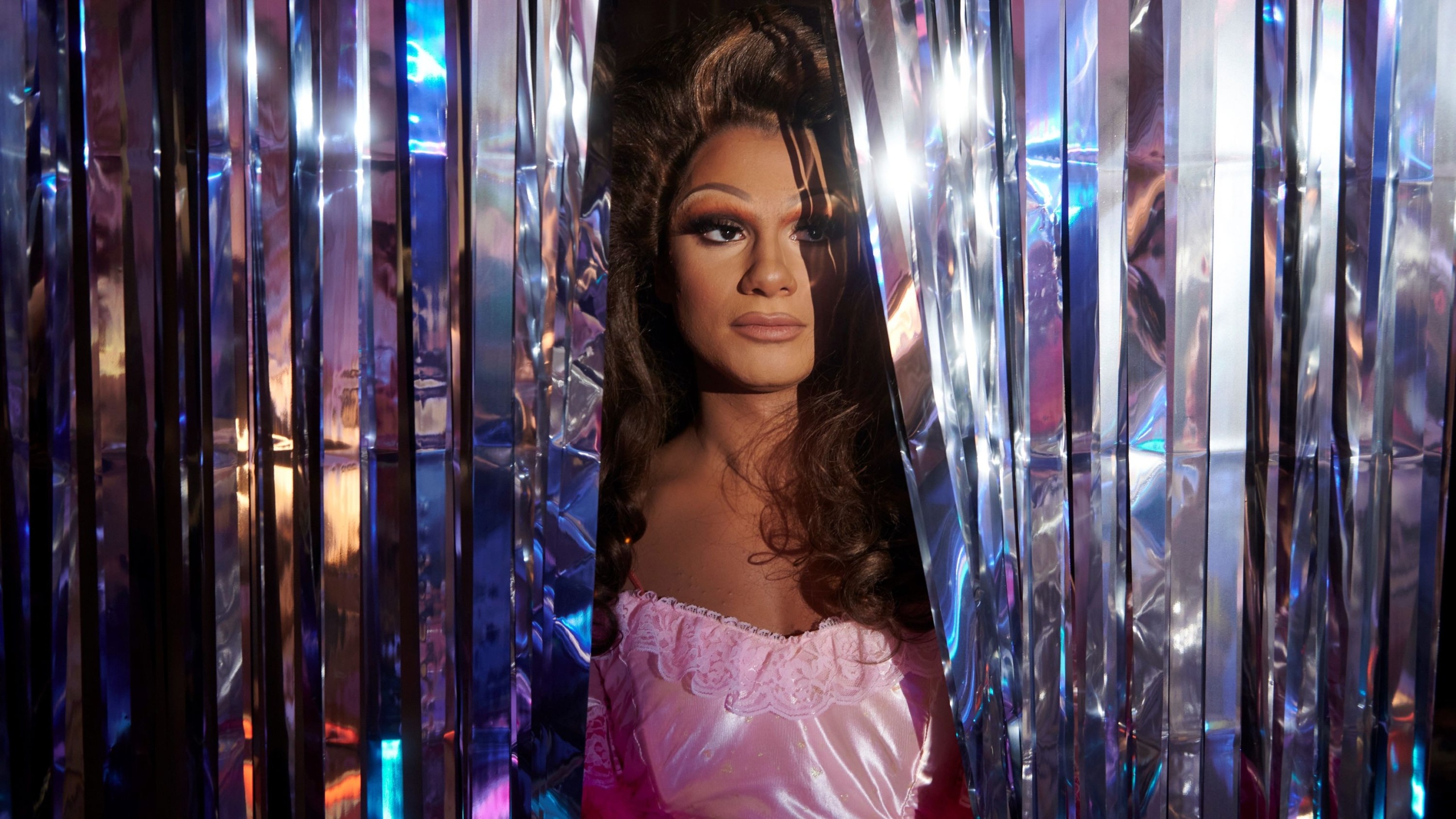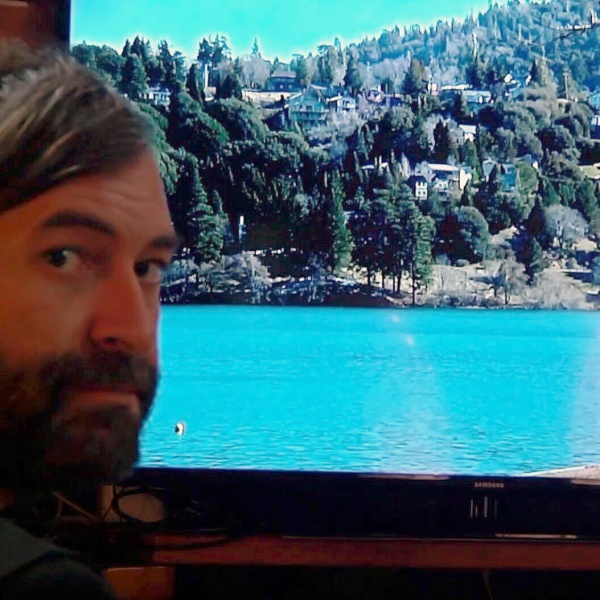In 2023, it’s up to young queer filmmakers to turn their cameras away from the trauma narratives that have so far mostly defined LGBTQ filmmaking and instead toward its potential for joyful expression and celebration. For cynics with a wary brow toward being uplifted, your mileage may vary for 1990-born drag performer turned filmmaker Amrou Al-Kadhi’s “Layla,” an exuberant appreciation of queer life even as it skims the surface of weightier issues around identity. But even the most callous of hearts — though anyone not already cosigned to the movie’s sensibilities is unlikely to see this film — will find it hard to skirt the charms of this sensitive, well-acted, and confidently shot feature about a non-binary Arab drag queen who gets lost in love but finds themselves at the other side of its failure. That’s even as many moments of the story feel manufactured just to keep it going.
Living in London, Arab drag queen Layla (Bilal Hasna) is witty and confident onstage, but desperate for any scraps of human-on-human connection behind the scenes in between the gigs they can scrape together. They have a compassionate collective of found-family friends and roommates, while their Muslim family meanwhile lives completely oblivious to their identity elsewhere in the suburbs. Nights are spent on Grindr scanning for potential hook-ups that could spark something deeper, an erotic curiosity realized only in hollow encounters with thrustings that advance nothing romantically. A summoned, more masculine and dom-top bed-warmer balks at Layla’s fake nails strewn on the floor, leftover from hastily unmasking after a performance. He pulls out, and goes home. Al-Kadhi shrewdly zooms in on the particulars of Layla’s queer day-to-day life, which involves applying faux lashes by day and douching by night. Such is the life, and it’s great to see it shown for the often banality that it amounts to.
Layla eventually books a thankless corporate gig performing at a diversity summit for a ready-made meal company. But when they’re compensated in a ream of coupons for said ready-made meal service over actual, you know, money for their time, Layla throws their hair down and publicly debases themselves in an unscripted performance far more compelling than what they’d planned: by dousing themselves in pre-packaged Udon noodles and flirting with the vapid, suited staff of the company. Layla’s unhinged and unplanned rebellion catches the eyes of one of the company men, Max (Louis Greatorex). Their accidental meet-cute in the bathroom leads Max to follow Layla on a druggy, blissful bender into the night, and a relationship, however cautiously formed on either end, sparks.
Al-Kadhi deliberately sets up a kind of Romeo-and-Juliet story here, where Layla and Max seem so unmatched for each other in all ways, Layla a much more outsized covered-in-glitter proud version of themselves where Max hides behind neutral clothing, and a vacant corporate job and bland, sterile shoebox apartment to match it. What’s undeniable and eventually pretty hot is the chemistry between Hasna and Greatorex, who share a number of explicit sex scenes together that also help shape the arc of their characters: Layla, eventually and unannounced, shifts their bedroom dynamic into something much kinkier involving a high heel and lubricant. Hardly scandalizing for anyone remotely tapped into niche sex, but refreshing to see onscreen regardless.
But their relationship, for all its highs, isn’t without crushing lows and doubts as Max starts to terrify over the prospect of being seen in public with someone who is so, well, themselves. Meanwhile, Layla has their own problems, including a sister very much in the dark about who they really are, and a traditional family still trying to set them up with a woman. Al-Kadhi also inches toward interrogating how straight-fronting, cis gay men find personal liberation in attaching themselves to the magical world of someone more unabashedly queer than they are. Eventually, Max gets too drunk at a drag ball and embarrasses himself in front of Layla’s already skeptical friends. Does he maybe also have some latent fetish for drag queens? His history prior to meeting Layla is unexplored, but again, this isn’t Max’s show.
Writer/director Al-Kadhi throws a lot of wrenches into the mix of Layla and Max’s relationship that feel very screenplay-machinated, but I suppose are unavoidable: They split up, fall apart, then fall back in bed together as circumstances wrest them from each other. The constant flip-flopping grows repetitive as we yearn again for the private moments of bliss they once shared, and Layla’s self-righteous friends also keep getting in the way, characters who only exist as sobriety checkpoints for Layla’s intoxicated-in-love heightened state. They don’t really stand on their own, and I wish this movie could just relax in its own inherent dramas rather than try to feverishly create more for the sake of a three-act structure.
Again, it’s not their show either, and Layla’s friend group here only exists to propel the drama. There are other only-in-a-screenplay moments that exist to advance the story, like when Layla has a run-in with someone definitely shocked to see them holding hands with a man in the street. This revelation remains undeveloped outside of a very hastily thrown-together throwdown catharsis between Layla and someone close to them at the movie’s end. Hasna’s performance throughout, however, is something special. He has only a small number of mostly TV credits to his name (including Netflix’s upcoming “3 Body Problem” and Hulu’s recent “Extraordinary”) but announces himself here as a serious leading actor capable of telegraphing all the ever-evolving, moment-to-moment fluxes in being a queer person who has to be so many people at once. In and out of drag, he’s spectacular, often pasted with an eager, hungry grin as the chaos-reigning feelings of love start to overtake Layla like MDMA beginning to take its course. Cinematographer Craig Dean Devine also deserves credit for mounting a vividly colorful, 360-world often captured in long takes that revolve literally around the leads, rarely breaking us out of their breathless connection.
The message at the end of “Layla” suggests that love does not and should not trump all, even when your identity is at stake. Even through the worst of heartaches, there’s never reason to regret a broken relationship that will ultimately make you stronger (hopefully?) because of it. The movie ends with cult queer songwriter/singer Arthur Russell’s “This Is How We Walk on the Moon,” a song that also concludes Ira Sachs’ “Keep the Lights On,” a movie that excruciatingly details a doomed gay relationship, and one I’d be shocked if Al-Kadhi hasn’t seen. “Each step is moving, it’s moving me up,” Russell sings. This film makes us believe that’s true for Layla, but that may be because we have Arthur Russell here to help tell us so.
Grade: C+
“Layla” premiered in the World Cinema Dramatic Competition at Sundance. It’s currently seeking U.S. distribution.


